
 |
|
|
|
In the last nineteen years Todd Haynes' Safe has picked up quite a reputation. I had only seen Haynes' 2002 Far from Heaven and was wholly disappointed; although it mimicked the look of Douglas Sirk's '50s potboilers it couldn't bring back their crazy complacent-radical vibe. Safe instead deals with new territory, addressing a modern phenomenon with impressive insight. It depicts the late-'80s concern that some people were becoming allergic to our polluted physical environment. Because Haynes has often taken up LGBT issues in his films, some reviews concluded that his show is about AIDS. I think Safe is about exactly what we see, people getting sick with ills that seem sourced not in physical ailments, but vague social and environmental anxieties. 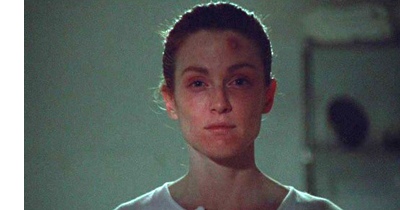
It is 1987. Carol White (Julianne Moore), a homemaker (not housewife) lives in an upscale Sherman Oaks neighborhood. Her life's work seems to be putting up an elegant and composed front, when inside she's a bundle of undefined doubts and voids. Normal pleasures are losing their personal meaning -- sex with her husband Greg (Xander Berkeley, her social life with her equally superficial friends. Carol's maid ignores her and she has no real relationship with her young stepson. Her life is wearing the right clothes and having the right furniture. Her only contact with the outside world is alarming TV and radio messages about vague threats and infomercials promising relief from life's problems with vague spiritual or holistic products - books, special diets, programs, etc. Carol develops real physical symptoms: headaches, a nosebleed, insomnia, skin blemishes. She's convinced that she's become allergic to chemicals in our food and toxins in the environment. Caught in traffic behind an exhaust-spewing truck, she cannot breathe and has anxiety attack. She faints at a baby shower. The doctors find nothing and Carol can think of no serious problems to discuss with the psychiatrist. Unable to cope, Carol finally signs up for the Wrenwood Center, an out-of-state desert rest spa. Its owner Peter Dunning (Peter Friedman) is a pleasant spiritual counselor. There she finds herself among people who have similarly become 'allergic to life' and are seeking a safe place away from perceived toxins. The trailer promoting Safe is almost exactly like one for a science fiction-horror film of the 1950s. Some unseen force or entity is stalking Carol White, filling her with anxiety. It's all around her: chemicals, aerosols, electromagnetic fields. Materially speaking, Carol's life is comfortable but sterile. She can't point to anything she lacks. She doesn't resent her husband or feel she's been cheated. Haynes' screenplay has the answer -- it's in the constant bombardment of radio and TV messages -- the 'threat of the day' news pieces on ominous environmental threats, and similar propaganda for physical and psychic cure-alls. Everybody uses fear to attract attention and to sell, even the top news shows. Everything is a crisis. 1 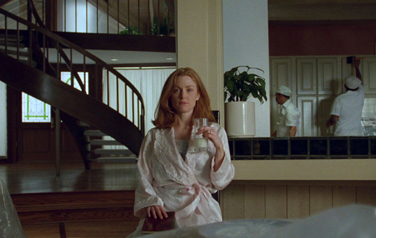
But the movie isn't called "Sick", it's called Safe. Carol is a victim of the modern world's anxieties, overwhelmed by an existential crisis that she thinks is a conspiracy to ruin her health.
That's why I'm shocked that nobody on the extras relates Safe directly to the post-nuke, runaway technology anxieties that form the core of classic science fiction movies -- the movie directly references them. The disc extras twice evoke a bad Lily Tomlin movie, The Incredible Shrinking Woman, because its housewife-heroine begins to shrink due to exposure to common kitchen chemicals. They ignore the source film The Incredible Shrinking Man. Its Robert Scott Carey endures the same medical-spiritual process Carol does. She experiences the same anxiety, alienation and a sense of physical deterioration, but minus the metaphorical shrinking process. Carol says her problem might be exposure to pesticides, which is precisely the source of Carey's strange ailment. Dennis Lim's Criterion essay calls Carol 'a person who barely exists', even before her malady causes her to isolate herself. The question of existence is made literal in the old science fiction movie as Carey becomes smaller. He loses his sex life, is considered a freak by others and finally breaks emotional contact with his wife. He's paralyzed by his loss of identity and a fear for an unknowable future. Carol's 'normal' life disintegrates in much the same way. She retreats from relationships and loses contact with all the material possessions by which she defines herself. Before she knows it she's a fearful mouse dragging an oxygen tank behind her, terrified that a cloud of 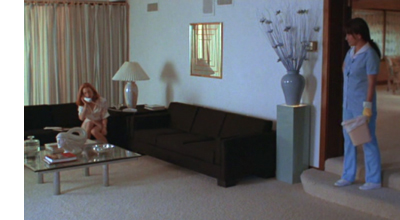
The film also evokes the paranoia-identity crisis of Invasion of the Body Snatchers: Carol seems as empty as that big house she lives in, unattached to real emotions and relationships. She relates more to a piece of furniture than she does the people in her life. Before she exhibits symptoms, her girlfriends remark in the gym that she doesn't sweat. Even as a joke, their subtle jealousy forms a barrier: she's not conforming to the group. Her anxieties quickly strip away her personal connections. Collapsing at a party? Too much drama there. What does she want, attention? Relationships based on appearances and convenience vanish. People become 'unreal'. Carol has emotional fits of crying, wondering what's happening to her. One way to detect a soul-less Pod in Body Snatchers is that they seem emotionally hollow, with no sense of humor. Offended by a dirty joke told at a dinner party, Carol looks as if she's about to have a nervous breakdown. Everything is suddenly intolerable. Her doctor is impatient and her husband behaves as if it's all in her head. Carol apologizes as if she's done something wrong, and she apologizes for simply existing. She's being displaced from her life; it feels as if her identity has been invalidated. This begins the process that ends with her voluntarily journeying to a rest isolation cult camp, where the 'help' she receives is mostly being told that she's creating her own problems. 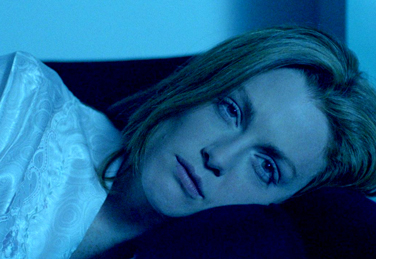
It's easy to blame Carol for being rich, but it would seem to be true that her affluence already isolates her from the mainstream. Her lack of inner resources - strong interests, curiosity about the world - makes her seem hollow. I lean toward the idea that Carol is like many people coping in a complicated world: she has no interest that is not self-interest. Her idea of shaking off her maladies is to get a hair perm. Haynes perhaps exaggerates, but Carol's friends are also ciphers just like her. They behave as if it would be a faux pas to bring a serious life problem into a conversation. Carol's affluence keeps her extended family at a remove. The only working people she interacts with are the vendors she patronizes, who give her big smiles and never say no -- a dry cleaner in her chi-chi neighborhood can't afford to offend a single customer. Carol has isolated her self from the rough and tumble of life that forces us to share the problems of people different from herself. Perhaps Carol is already a hollow Pod Person lacking in humanity and too weak to deal with anything psychologically disturbing. It's a full-time job making sure her dry-cleaned wardrobe is ready -- when she goes out to dinner she looks like Grace Kelly. Peter Dunning isn't a doctor but instead another 'service provider' courting upscale customers. He offers no real services but feel-good speeches and happy-think songs. He surely intuits one thing, though, as he advises his clientele to stop listening to the news or reading the papers. This is before the major impact of the Internet, when the term 'information overload' cropped up. The client-visitors at the Wrenwood Center naturally become more isolated and paranoid, not to mention dependent on Dunning's services. Nobody talks to each other at meals. The 'disease of insecurity' is contagious, as seen when a sympathetic wife contracts her husband's depression-sickness. Becoming more fixated on her 'vulnerability', Carol covets another guest's custom isolation chamber, a sealed igloo that re-circulates filtered air and locks out all the evils that prevent one from being 'safe'. To us it looks as if she wants to climb into her own grave, beyond the reach of her fears. 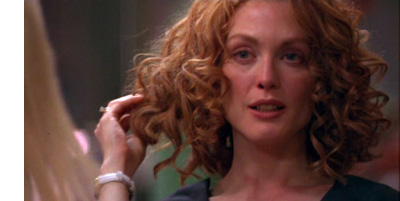
Safe does not feel like a satire, nor does Carol White seem an undue exaggeration. Todd Haynes directs his show with an observational clarity that makes us feel that truths are being revealed. We recognize all the 'types' in the film but none are judged. It's not a for-sure certainty that Peter Dunning is a predator -- he certainly seems sincere. Carol doesn't socialize much, not even with the young guy (James Le Gros) with whom she does cooking duty. Her fellow client-patients surprise her with a birthday party. She's truly touched, and apparently strengthened when she faces a mirror and tells herself, "I love you." But was the party suggested by one of Dunning's spectacularly sincere/insincere helpers?
It seems obvious that problems sourced in isolation and alienation can only fester by living in a situation as unnatural as Wrenwood. The scene that best demonstrates this shows Denning talking to a small group of his clients, asking where they think their problems came from. One lady blames everybody for her problems and looks bitterly away when Denning dispenses yet another useless homily. Then a woman named Joyce (Jessica Harper) speaks briefly of her grief, in a way that makes us want to reach out to her. Neither Carol nor anybody else offers any sign of compassion, as each is selfishly wrapped up in their personal issues. Carol has become incapable of relating to others. She resists when her husband visits and tries to hug her. She'd rather stay sealed off in a 'safe' igloo, trying to convince herself that she's a human being. 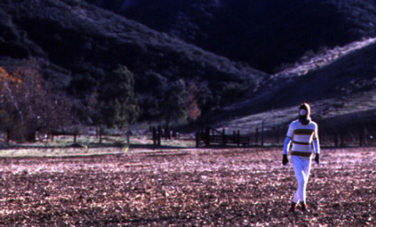
Safe is not a science fiction film about an 'alien' menace that wants to take away our humanity or convince us that 'we don't exist'. It asks if we are instead doing the same thing to ourselves. The ultimate statement of this is a Wrenwood client who paces the desert nervously wearing head-to-toe sweats and knit gloves and hood, terrified to be in contact with any thing or anybody. We see him only in longshot. He's out there all alone, a modern mummy. On paper Carol White seems almost unplayable; it would be so easy to overstate everything. No wonder Julianne Moore became the number one actress for movies with an intellectual bent -- her combination of uncomprehending innocence and sophisticated paranoia is fascinating. I certainly can't call this challenging picture 'fun' but I found it extremely illuminating and personally meaningful. Despite Moore's fantastic performance, Safe is just too original to attract Oscars. It is twice as accomplished as 1995's 'art film' winner Leaving Las Vegas. It did win a bushel of regional and critics' prizes. The Criterion Collection's Blu-ray of Safe presents this very precise film in a splendid scan that optimizes everything -- Carol's sterile home, the impersonal Ventura Avenue vendors and cafes she haunts, the ugly clutter of the freeways and the mind-destroying commercial propaganda vomited 24-7 from the television tube. I worry a bit about that desert location, though - it does not appear to be the best spot for hay fever sufferers. Criterion's extras are a fine introduction to director Todd Haynes and his impressive producer Christine Vachon. They're heard with actress Julianne Moore on a feature commentary to discuss the filming, in particular Moore's unusual role. The shoot was serendipitously (?) interrupted by the 1994 earthquake, which that added another element of instability. They also talk about the development of the organ soundscape provided by Ed Tomney, which mixes with subliminal 'atmospheric' tones like those used in Jonathan Demme's The Silence of the Lambs. Haynes and Moore appear on camera for another talk about the film, and Ms. Vachon goes solo to profile Haynes and explain the odd politics encountered by her film -- voices in the LGBT community criticized Haynes for addressing the problems of a white, straight woman instead of the AIDS crisis. Haynes' 1978 super-8 amateur movie The Suicide is about the torment of a bullied Junior High kid, and despite the splices and iffy camerawork is a serious and impressive drama. As I claim, the trailer for Safe does indeed come from the same template as allegorical Sci-fi thrillers like The Thing or The Andromeda Strain. Dennis Lim's insightful insert essay is printed on a folding flyer instead of a booklet.
On a scale of Excellent, Good, Fair, and Poor,
Safe Blu-ray Footnotes: 
1. I must admit that I'm slightly freaked out by the pharmaceutical ads presently dominating prime-time network news shows. They're all touting expensive name brand drugs; they urge us to 'ask our doctors' and then bleat out horrible lists of fatal-sounding 'possible' side effects. People my age are already wondering which illness out there "has my name on it". These ads make it sound as if everything is toxic, or worse, that it's normal to be sick, that stupid people who think they're healthy are too dumb to see the ax falling. This advertising-propaganda borders on absurdity. I almost expect to see an ad for a deadly poison, followed by an ad for a poison antidote. Both spots would be accompanied by images of pleasant, healthy looking people and a soothing voice saying frightening things.
Occupying in the same news-time commercial slots are the potency ads with people who look like department store mannequins 'getting in the mood'. I don't know about you, but seeing two standard bathtubs sitting side by side does not turn me on. Although I must admit that I haven't tried sitting in a tub staring at a gorgeous sunset: "If I told you what it takes to reach the highest high, you'd laugh and say nothing's that simple..."
2. (referring to the image, right.) Ah yes, an underground comix cover by R. Crumb instantly evokes the spectacle of ordinary lumpen citizens numbed by the modern world, retreating from reality to the "safety" of their TeeVee. And they aren't even being assaulted by today's entertainment news and reality programming. "Plunge into the Depths of Despair." He: "See if there's anything good on..." She: "Why bother?" I relate this to Todd Haynes' Safe, even though it's taking place at the other end of the social/economic scale.

The version of this review on the Savant main site has additional images, footnotes and credits information, and may be updated and annotated with reader input and graphics.
Review Staff | About DVD Talk | Newsletter Subscribe | Join DVD Talk Forum |
| ||||||||||||||||||